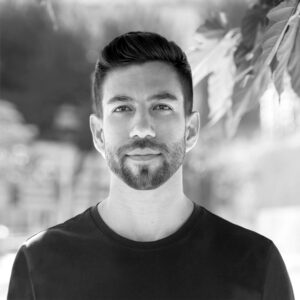
In this video:
Itai is a practicing architect, researcher, and multidisciplinary artist focusing on the relationship between people and place. He is the Founder of The Centre for Conscious Design, and Director of Hume – a Science-Informed architecture and urban design practice.
In 2015, Itai founded the Conscious Cities movement; a new field of research and practice for building environments that are aware and responsive, using data analysis, AI, tech, and science-informed design. For his work in advancing changes in the design profession, he was named by Metropolis Magazine as one of 2020’s ‘Game Changers’ in transformative ideas in Health, Social Justice, Technology, and Urbanism.
Itai carries out thought leadership and advisory roles in a number of other research and policy bodies, contributing to strategies that focus on systems change and the promotion of design as a socially conscious profession.
His work and writing has been featured internationally and he is a regular speaker at events focused on the built environment and human impact.
The modern city has captured society’s imagination as a symbol of free and democratic expression, a commons for open dialogue. However today both art and science are pointing at the city’s more worrying ability to silence and marginalise voices. Every space we shape inherits a social contract that guides our behaviour, and either affords or takes away our agency for different forms of expression. In the public sphere, social contracts can support or hinder social interactions that affect social cohesion, resilience, and even innovation. A city open to more forms of expression that represent the spectrum of human experience will create a culture with a richer, deeper dialogue. How can we make spaces and places that encourage more forms of healthy social interactions? How do we change the contract and regain our agency in the city?
Ishai Karasenti
Choreographer, teacher and dancer. Former gymnast, alumnus of the dancer’s training program of Bat-Dor dance center Beer-Sheva. Former dancer of the “Israel Ballet” dance company, took part in several productions such as: Suzanne Dellal Centre in cooperation with the Israeli Opera. Ishai Karasenti has along with Mira Rubenstein developed an approach to dance off-stage that is situated in the physical, political, and social dimensions of the public sphere. Their work is composed of both theatre and dance and the use of public space to create dialogue.
Mira Rubinstein
Choreographer, teacher of classic ballet, born in Tel Aviv, married to Sharon and mother of two. alumnus of Thelma Yellin high school and the Bat-Dor dance studio. graduated with honors from London Studio Centre (Middlesex University) with a bachelor’s degree in dance and performing arts in which she received a scholarship. Her work has been presented in the Cameri theater, Tmuna theater, Orna Porat Children’s Theater, Tzavta theater and in many dance and theatre festivals in Israel and across the globe. Rubinstein has along with Ishai Karesanti developed an approach to dance off-stage that is situated in the physical, political, and social dimensions of the public sphere. Their work is composed of both theatre and dance and the use of public space to create dialogue.
Organised by
Explore more

Become a Member!
For unlimited access to all articles and videos, become a member though our Patreon. Your support means that we can sustain creating resources and events, elevate a growing community of practice, and further our collective values and mission.
